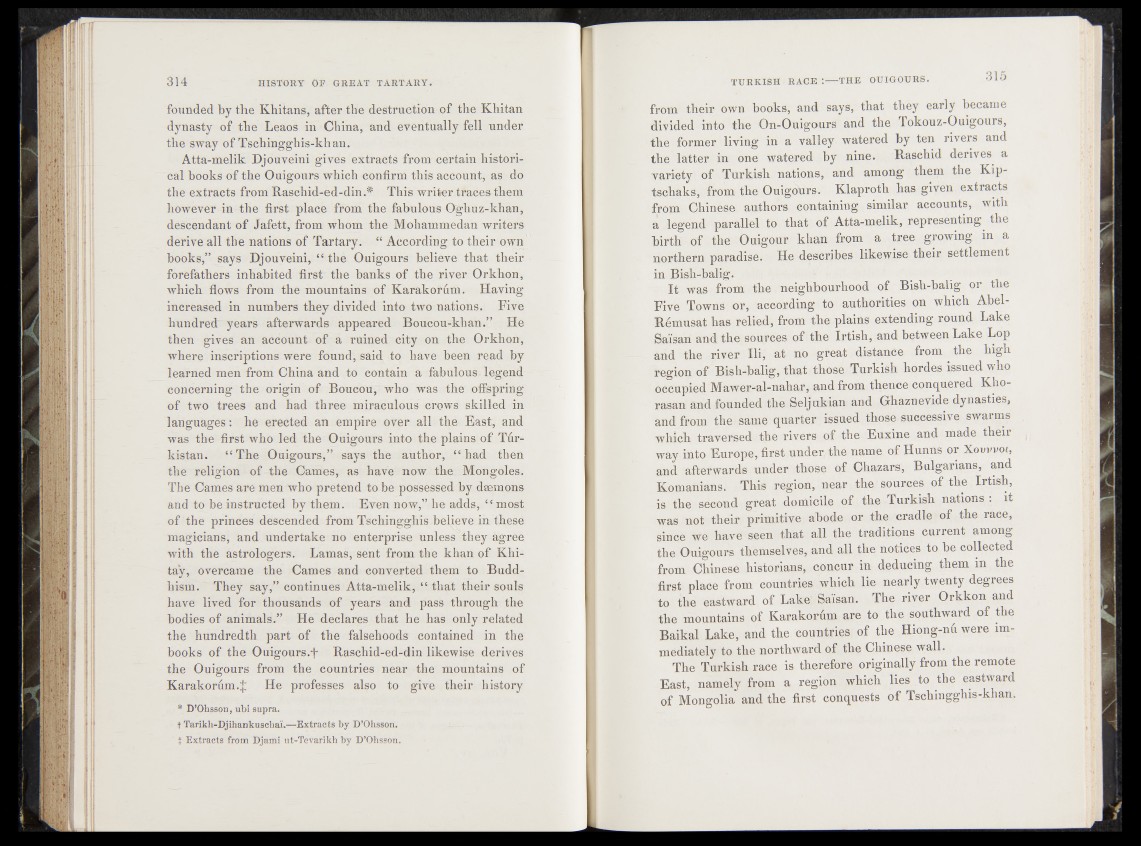
founded by the Khitans, after the destruction of the Khitan
dynasty' of the Leaos in China, and eventually fell under
the sway of Tsehinggh is-kh an.
Atta-melik Dj ou veini gives extracts from certain ««historical
books of the Ouigours which confirm this account, as?t d@
the extracts from Raschid-êd-din.* This writer,traces-them
however in the first placé from the fabulous Oghuz-kh&n’,
descendant of Jafett, from whom the Mohammedan writers
derive all the nations of Tartary. “ According to their own'
books,*’ says Djouveini, “ the Ouigours believe that them
forefathers inhabited first" the banks of the river Qrkhon,
which flows from the mountains of Karakoróm. Having
increased in numbers they divided into two nations.« Five
hundred~ years afterwards appeared Boucou-khan.p^a lie
then gives an account of a ruined eity on the: Orkhon,
where inscriptions were found, said to ha verbeen read «by
learned men from China and to contain a ^fabulous-legend“
concerning the origin of Boucou, who was the' oflkpring
of two trees and had three miraculous; crows; skilled in
languages : he erected an umpire t*ver all the- East, and
was the first who led the Ouigours into the plainsfof jTue-
kistan. “ The Ouigours,” says the author, “ -had then
the ' religion i of -the Cames, as have”' now the_ Mongoles.
The Games are men who pretend to bê possèssed by daemons
and to beinstructed by them. Even now,^he ad d s-m o st
of the princes descended from Tschingghis^believe in these
magicians, and undertake no enterprise unless they-agree
with the astrologers. Lamas, sent from the khan of Khi-
tay, overcame the Cames and converted them to Buddhism.
They say,” continues Atta-melik, “ that their souls
have lived for thousands of years and pass through the
bodies of animals.” He declares that he has only related
the hundredth part of the falsehoods contained in the
books of the Ouigours.f Raschid-ed-din likewise derives
the Ouigours from the countries near the mountains of
Karakorûm.J He professes also to give their history
* D’Ohssou, ubi supra.
■ t Tarikh-Djihankuscliai.—Extracts by D’Ohsson.
' t Extracts from Djami ut-Tevarikh by D’Ohsson.
from* their own* b$$k# and say# that they early became
divided the Onr©u|gpurst and the Tokouz-Ouigours,
living |pl| a valley, watered -by ten rivers and
the latter« in ofi-q watered* by nine. Raschid derives a
variety* of Turkish, nations, arid;- among them the Kip-
tschaks, from theipiigobrs. Klaproth has giyen. extracts
from Chinese. authorS,i||ntaining similar accounts, with
a.legend .parallel to/that^f«Atta-melik, representing the
birth of ther#$)uigour khan frohi ,a tree grawing in^a
northern p a ra d is eH e desp#tes; likewise their^ settlement
in Bish-balig. mb; -v ’.* ? >■' 1 - a I 1
It Was* from the i^gbbourho.q4,rof Bish-balig op. the
Five Towns'* or, ^ e ^ d i|n 0 i^ a u th p ritie s ^ n veh^sh Abel-
RSmusat has-relied?, from fhe plains extending, round Lake
Saisari an<kthe|sources of the Irtish, and btfet^nXake Lop
$nd the river) Ili, at no igreaf -distance -high
'region:of^ish-balig, that^hos^Turkish'Lqrdep.issued who
>4®gupied Mawer-al-nahar^and from thqncescpnquered Kho-
rasan and founded the,-§:elj ukians,and^iGhazne vi#. dynasties,
and froth Jhefsame quarter^issued* .tlfojse, succes^v^.swacrri&
which)traversed tjie rivers ofofheusEuxine »and. m # e their
way Into Europe, firat?u-ndef/#ie}n a n ^ ^
and afierwards under thoaq qf - Chazars, Bulgarians^ and
Romanians. This region, n e a r.th e ^ u |e p * p f tbe Irtish,
is the second great ^domicil# ;of. the^Turkjfh; Sp-atip,ns • | |
was not their.-primitive:subo4e or the-;’cradl^fbf the race,
sinee we have7seen «that;: all the^itraditions curren-% among
the-' Ouigours themselves,, and allfhquop|m to he collected
from Chinese historians, *^ncur in deducing them m the
first place from countries which fke'nearly tjyenty degrees
to the eastward of Lake^aisan. The river Orkkpn and
the mountains,of Karakorfon,are to,the southward
Baikal Lake, and the. counferiesi of jtfee Hiong-nu were immediately
to the northward of; the Chinesg|-j^al.^. s ,«.»• r
The Turkish race is therefore originally from the remote
East, namely from a region, which lies to the eastward
of Mongolia and the first conquests of Tschingglus-khan.